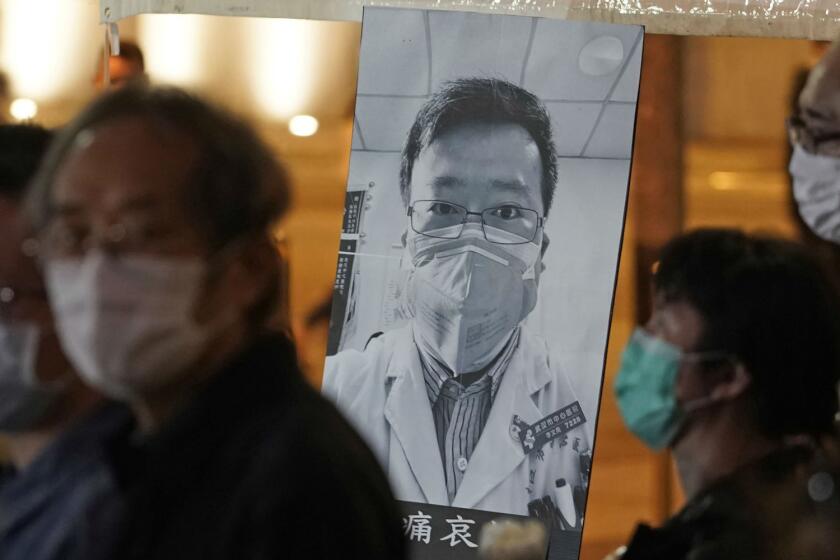Before the coronavirus, Hollywood was preparing for a writers strike. Why that’s less likely

- Share via
Hollywood has been devastated by the coronavirus outbreak, which has triggered a wave of production shutdowns, movie theater closings and thousands of job losses across the film and TV businesses.
Could the pandemic also disrupt key negotiations between the studios and Hollywood writers?
Until a few weeks ago, film and television business executives had been making contingency plans to prepare for a possible strike by writers, which would be the first walkout since the 2007-08 strike that lasted 100 days and shut down much of Hollywood.
The 10,000-member Writers Guild of America has been increasingly vocal about how many of its members have been left behind by the boom in streaming.
The latest updates from our reporters in California and around the world
Now there is doubt over whether contract talks with employers represented by the Alliance of Motion Picture and Television Producers will take place on Monday as planned.
The coronavirus spread has created an entirely new and harsh economic environment for writers and other industry workers, many of whom have suddenly lost their jobs, and their employers, who are facing massive financial losses. Among the hardest hit is industry leader Walt Disney Co., which has been forced to shut down its lucrative theme parks.
“The current economic environment makes the prospect of a writers strike less likely,” said Daniel Stone, partner in the litigation and entertainment and media groups at Greenberg Glusker. “COVID-19 has brought film and television production to a grinding halt, and we are all living in a time of uncertainty. No one wants to face the prospect of prolonged unemployment during a recession.”
The WGA and AMPTP declined to comment.
Before the pandemic exploded in the U.S, the Directors Guild of America secured a tentative agreement on a new three-year deal with the AMPTP, which promised increases in minimum salaries and a nearly 50% increase in residuals for members working on original shows made for subscription video on-demand series.
The deal agreed to by the directors, who usually negotiate first, sets a potential bargaining framework for two other unions, SAG-AFTRA and the Writers Guild of America, whose contracts expire June 30 and May 1, respectively. The WGA was scheduled to begin talks March 23 and is likely to push to improve on the terms achieved by directors, said people familiar with the negotiations who were not authorized to comment.
Talks with the AMPTP usually occur at its offices in Sherman Oaks, with representatives from each of the major studios it represents, including Amazon and Apple, as well as the union’s negotiating committee and support staff.
But as most companies have shifted to remote working to reduce the spread of COVID-19 and cities have restricted large gatherings, it is highly unlikely those meetings can now take place in person.
One option would be to conduct negotiations via video conferencing platforms like Zoomand quickly agree to a new deal. However, some labor attorneys think that would be challenging even though many companies are working remotely, in part because so many groups are involved in various aspects of the negotiations. More likely is a postponement of the talks and extension of the contract term.
“There is a potential, not surprisingly, that the date for WGA negotiations gets postponed given what everyone is dealing with as a result of the pandemic,” said Ivy Kagan Bierman, an L.A.-based entertainment lawyer who has represented production companies on labor issues. Now “most of the industry is shut down, it will be much more difficult for the writers to get the support of their members for a strike.”
There is precedent for extending contracts. Just last year, SAG-AFTRA, Hollywood’s largest union with some 160,000 members, needed more time to renegotiate its commercials contract and agreed with a group of advertising agencies to keep talking while continuing to operate under the terms of its existing 2016 arrangement.
Another consideration for WGA negotiators is to assess how the pandemic could change the industry, further accelerating the march toward streaming. With many cities and counties closing cinemas and other entertainment venues, studios have halted film production and released those planned for theatrical distribution on home video sooner than planned.
Streaming is being boosted further as quarantined Americans spend more time at home. But while new video platforms have created more job opportunities for writers, many complain that they have not had a share of the rising profits at the studios.
Producers are creating shorter seasons and writers are losing out on revenue from what would have been syndication, or the reselling of their shows. That would have been at the heart of upcoming talks, but guild negotiators are likely going to want to address new issues raised by the pandemic, such as protections against shutdowns and job losses.
“I already had one union tell me that they are considering what additional provisions they may need to negotiate to protect their members,” Kagan Bierman said.
While preparing for these minimum basic agreement negotiations, the WGA has also been waging a battle with talent agents over fees they take to package together writers, actors and producers together for shows. Last April, the WGA instructed its members to fire their agents who did not follow the union’s code of conduct. However many writers have been able to continue working with or without their agents.
Meanwhile, some high-profile guild members have rallied to help those affected by the production cancellations, estimated to have caused more than 100,000 job losses in the film and TV business.
This week, writer John August has been helping an effort to raise funds for those on the lowest rungs of Hollywood’s ladder, its assistants, who were struggling to make ends meet before the shutdown left many out of work. The group has raised more than $300,000, well over its $100,000 target.
Like other colleagues, August, a writer on Disney’s “Aladdin” live-action remake, has continued to work on projects during the disruption, holding meetings on Zoom and encouraging his followers on social media to engage in writing challenges.
“The real luxury I have as a writer is I can stay home to do my job,” said August, who sits on the WGA’s negotiating committee but declined to comment on the planned talks. “A grip, a gaffer or a background player can’t. So as we emerge from this, I want to make sure the whole industry looks out for the health, safety and sustainability of everyone who has to come together to make our film and television.”
Of course, the ability to keep working gives writers some leverage against the studios as they rebuild their pipelines of content in coming months to feed new streaming services.
But as the country faces a greater likelihood of recession, it will be tough for the guild to build support for a walkout from writers and other industry workers reeling from job losses, labor experts said.
“Unions do really rely on public support and sentiment for their positions,” said David Smith, a professor of economics at the Pepperdine Graziadio Business School. “My sense is that the public sentiment for any work stoppage, or any sort of dispute that could be pinned on the union, would be declining. A lot of people are relying on entertainment right now to get by.”
More to Read
Inside the business of entertainment
The Wide Shot brings you news, analysis and insights on everything from streaming wars to production — and what it all means for the future.
You may occasionally receive promotional content from the Los Angeles Times.












